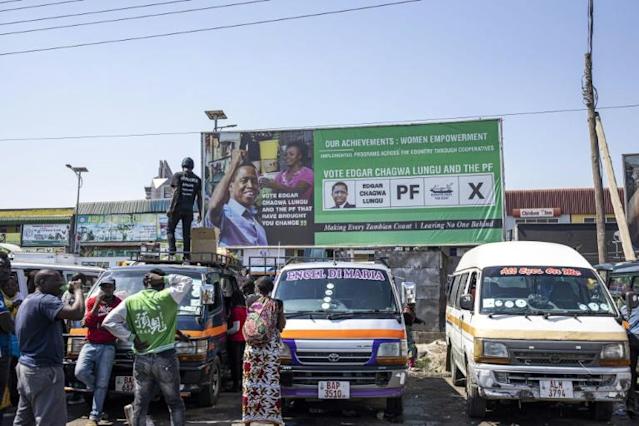LUSAKA, Zambia – Despite the excitement of voting for the first time, Lusaka resident Anita Chabala preferred not to sport the red colours of Zambia’s main opposition party on the bustling streets of the capital.
“You might get attacked,” said the 21-year-old, standing inside the opposition United Party for National Development (UPND) offices in a purple T-shirt and jeans. “At the moment we have been advised not to wear any regalia.”
Zambia votes in presidential elections Thursday, a tense and closely fought race pitting the incumbent Edgar Lungu against longstanding rival Hakainde Hichilema. Legislative elections take place the same day.
In Lusaka, strips of green carrying extracts from the ruling Patriotic Front (PF) party manifesto, posted on walls and wrapped around lampposts, dominate the occasional dashes of opposition red.
Flashes of PF party green also appear on patterned skirts, T-shirts and the occasional coronavirus face mask.
Portraits of President Lungu’s face grin down from billboards as the lunch-hour traffic moves slowly through the city centre.
Women weave through the crowds, large baskets of fruit balanced on their heads, past street vendors hawking anything from loofahs to Bibles.
This is the third time Lungu, 64, faces off against Hichilema, 59, but this time the polls indicate it is their tightest electoral race yet.
Surveys suggest support for Hichilema’s UPND has grown in Lusaka, spurred by growing economic hardships.
Traditionally, this is a PF stronghold. But at Lusaka’s City Market, crowded with noisy minivan taxis, locals spoke up for the current leader.
“We don’t want another president, we want Edgar Lungu,” said Lydia Mwansa, 35, a mother of seven selling handbags.
Vendors around her vehemently agreed, speaking of the roads, hospitals and schools built during Lungu’s presidency.
“The PF are making a lot of things, they are hardworking,” said banana-seller Justina Nsama, 42, showing off a photo of Lungu printed on her white T-shirt.
“He is strong and very humble towards the people,” she told AFP.
Lungu has invested heavily in infrastructure since he was first elected in 2015, following the death of his predecessor, Michael Sata.
Lusaka has been transformed during Lungu’s rule, with wider roads and overpasses slightly easing traffic.
On Sunday, airport staff were busily preparing for the inauguration of a Chinese-built terminal. It opened last week despite lacking most of its facilities.
Critics accuse the president of plunging the copper-rich country into a debt crisis through unsustainable borrowing.
On the quiet side-street that houses the UNPD headquarters, flustered party officials glanced nervously around them as they ushered in journalists.
“The environment in Zambia is not good for the opposition,” one of them muttered.
Party activists were nervous about being filmed, concerned that the camera would pick up their conversations.
But one UPND supporter, pastor William Njombo, was willing to be interviewed.
“We don’t feel that safe… there is so much intimidation,” he said, concerned about Lungu’s decision to deploy the army to police the vote.
A week ago, Lungu ordered the military onto the streets to quell electoral violence after three of his party supporters were killed.
Like many Zambians, Njombo said he still appreciated the infrastructure projects.
“But they have come at a huge cost,” he said. “We are now faced with a huge mountain of debt.” – AFP
















